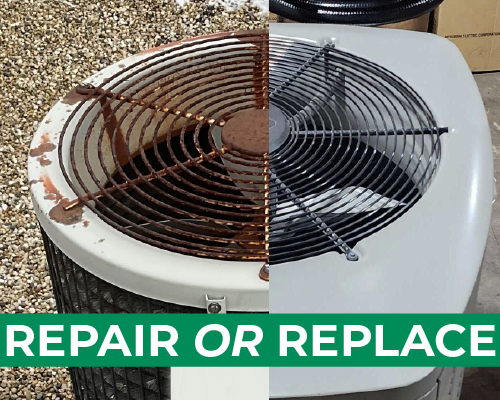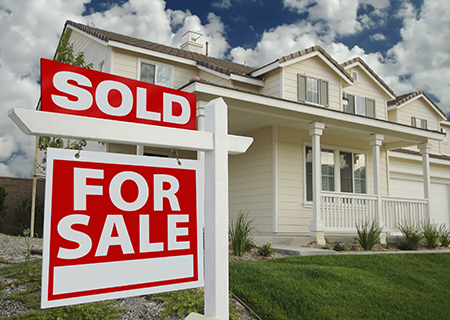
June 2023
By: Josh Walejewski
Read Time: 3 Minutes
Should you repair or replace your AC?
Deciding between repairing and replacing your air conditioner is challenging for any homeowner. With the scorching summer heat just around the corner, it’s essential to ensure your cooling system is operational to stay cool and comfortable.
In this month’s blog, we aim to shed light on the factors that will help you determine whether it’s best to repair or replace your air conditioner. By understanding the key considerations and weighing the pros and cons, you’ll be well-equipped to make an informed decision that suits your comfort needs and budget.
How old is your air conditioner?
The age of your equipment is the most important factor when contemplating repairing or replacing your air conditioning unit. An air conditioning system has an average lifespan of 12-15 years. If your AC is less than 10 years old, repair is often your best option.
The “5,000 Rule”
There are two general rules of thumb to consider that can help homeowners determine whether it is best to repair or replace their air conditioner. The first rule, known as the “5,000 rule”, says to multiply the age of the unit by the cost of the repair. If it exceeds 5,000, then it may be better to replace the unit with a newer and more efficient system. If the total is less than 5000, a repair is likely the better route.
For example, your ac unit is 10 years old and it needs a new capacitor that costs $200. In this scenario, we would multiply the unit’s age (10) by the cost of the repair ($200) to get a total of 2000. According to the rule, moving forward with the repair is best.
The “two-thirds, 25 percent rule”
The second rule, known as the “two-thirds, 25 percent rule”, says that if your AC unit has been in operation for more than two-thirds of its expected lifespan (15 years) and requires repairs that exceed 25 percent of the cost of a new unit, it may be best to replace.
For example, if your 11-year-old air conditioner needs a new compressor that costs approximately $2000 and a new air conditioner costs $5500, the “two-thirds, 25%” rule would say replacement is best.
Both general rules of thumb can help homeowners gauge whether the investment in repairs is justified or whether it’s more cost-effective and practical to opt for a replacement. Of course, if your equipment is still covered under warranty, choosing a repair is likely the better option since your warranty won’t cover the cost of a replacement.
How long do you expect to stay in your current home?
 Be realistic and determine how long you plan on staying in your current home. Even if your unit is older, replacing it might not be a wise investment if you plan to move within the next few years. Unless your unit is constantly needing repairs or has a catastrophic failure. It’s worth noting that when selling your home, potential buyers may request a reduction in the sale price if the AC unit is old or poorly maintained.
Be realistic and determine how long you plan on staying in your current home. Even if your unit is older, replacing it might not be a wise investment if you plan to move within the next few years. Unless your unit is constantly needing repairs or has a catastrophic failure. It’s worth noting that when selling your home, potential buyers may request a reduction in the sale price if the AC unit is old or poorly maintained.
On the other hand, if you don’t have immediate plans to sell, the peace of mind that comes with a new unit and an extended warranty can be compelling reasons to consider an air conditioning replacement. A new system brings reliability, energy savings, and enhanced comfort for the foreseeable future.
Is your current AC system properly sized?
If your ac system needs repairs and getting up there in age, you will also want to consider whether your existing equipment is properly sized for your home. Whether undersized or oversized, a poorly sized HVAC system can lead to quite a few issues and increases the likelihood of needing frequent repairs. If you discover your system is sized incorrectly, replacement options are worth exploring. A new system that is properly sized will prevent the inconveniences and costs that come with improperly sized systems.
Symptoms of an Oversized System
When a system is oversized, it can lead to a range of problems that the repair won’t be able to fix. An oversized system often suffers from short cycling and tends to cool or heat the space too quickly, causing the system to turn on and off frequently. Short cycling leads to inefficient operation, a shortened lifespan, inadequate humidity control, and uneven temperatures throughout your home.
Symptoms of an Undersized System
An undersized system also brings many issues. An undersized system may struggle to cool or heat the space adequately, especially during extreme weather conditions. It may take longer to reach the desired temperature, resulting in reduced comfort, excessive run times, increased wear and tear, and higher energy costs.
Key Takeaways
Ultimately, consulting with a professional HVAC technician is crucial in making an informed decision. Our certified technicians can assess your specific situation, provide expert guidance, and help you determine the most cost-effective and efficient path forward. By carefully considering these factors, you can make a well-informed choice that balances your comfort needs, budget, and long-term benefits.
Read more blog posts from Kettle Moraine Heating & AC.
About the Author
Josh Walejewski
Josh is a professional marketer who has worked in the HVAC industry since 2017. With a Bachelor of Applied Arts and Sciences Degree (B.A.A.S) in marketing and sustainable business management from the University of Wisconsin, he has a passion for all aspects of HVAC, business, marketing, and environmental stewardship.





